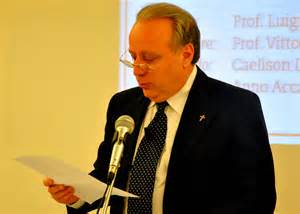
The Trinitarian Ontology of Piero Coda and Evil
 Evil, I write in capitals because it is the ontological category in which the bad of our enemies and everyday slips are just components, must be seen within the Christian tradition and many other religious traditions as what should be despised, fought and ultimately eliminated, and this is a lack of Trinitarian ontology.
Evil, I write in capitals because it is the ontological category in which the bad of our enemies and everyday slips are just components, must be seen within the Christian tradition and many other religious traditions as what should be despised, fought and ultimately eliminated, and this is a lack of Trinitarian ontology.
But if we understand the figure of the Trinity in the Christian tradition, the relationship of three persons in one being, this takes us immediately to agapic love as the basis of religion and that is where we review the misconception of God and a way of religion.
It would be possible to understand this purely philosophical way, yes and no, but because we can understand the Father as someone with some authority, his son as immanent to the Father, and the Holy Spirit as a being with a force capable of resolving differences and this authority and immanence relationship establishing communication and full communion of the three beings.
Not because we would be reducing the love agapic of three beings, who in a very profound way do they are one Being and this is not understandable without the light of faith.
Piero Coda uses a category of the Focolare Movement’s founder, who is the figure of Jesus forsaken to make this epiphany an everyday relationship with all beings and thus creates a Trinitarian ontology, which is able to establish a relationship between the express Logos in Jesus and fully realized in his figure when we lose heart and give the pain and suffering on the cross, not more calls God Father, but only God: “my God, my God why have you forsaken me” says the Biblical account.
What is the practical lesson of this biblical figure power would say something paradoxical God is no longer God, but man, a bridge between man and the Lord takes place, and continues to be held in all the pain, suffering and humanitarian disasters, then the Trinitarian ontology penetrates in daily life.
To break the “wall of hostility” (Eph 2: 14) Jesus at that time creates a new relational field, everyone has access to the Other (God) in dynamic and reciprocal motion, and this field can extend to all mankind, and performs already today dialogue between religions and cultures.
Coda says: ” in qualche modo ci é comunicata nella storia l´eterna circulazionde d´amore dei Tre … il loro aprirsi ala storia degli uomoni” (Dio uno e trino, Edizione San Paolo, 1993, p. 141).









